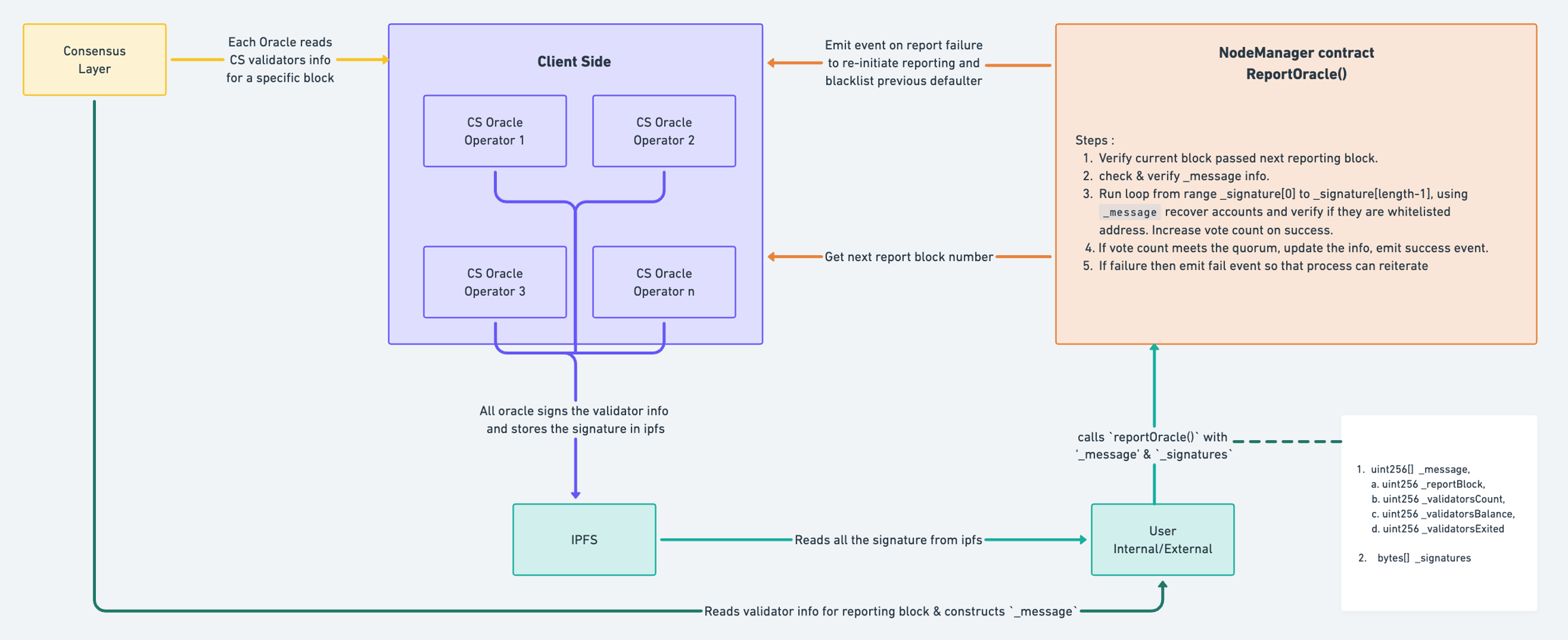Oracle
The csETH oracle, developed by ClayStack after extensive research and development, is a highly efficient, decentralized, and secure solution. Its primary function is to ensure the timely and accurate updating of crucial information regarding the protocol's validator nodes and transferring data from the consensus layer to the main chain (execution layer). The oracle specifically handles the update of information such as validator balances and exchange rates. This update process occurs approximately every 24 hours.
The oracle has been designed to be run by any user, even on low-end machines, making it a cost-effective option. Initially, the oracle will be a trusted list of whitelisted oracle operators. As the network grows the trusted network will be expanded and eventually the oracle will be fully decentralized.

How it works
Oracle Operators
The Oracle operators retrieve the next block number for reporting from the ClayStack NodeManager contract, which determines the validators' information to be fetched. Each operator maintains a list of ClayStack validators for which they need to fetch information. Using the consensus layer APIs, each operator extracts the relevant information for each validator at the specified block.
Once the operator has gathered the validator information, they curate it into the required format. Subsequently, they generate a signature by signing the curated data using their own keys. To ensure security during signature generation, the operators employ the ECDSA (Elliptic Curve Digital Signature Algorithm).
Upon generating the signature, the operators proceed to write it onto IPFS (InterPlanetary File System) for storage and accessibility. This process ensures that the generated signatures are securely stored and readily available for verification and further usage.
Oracle contract
Claystack's NodeManager contract incorporates the oracle functionality for on-chain operations. This contract includes important states that are dependent on the oracle, such as a list of whitelisted oracle operator addresses, the quorum requirements, and the next block number for oracle reporting.
The oracle reporting function in the NodeManager smart contract is publicly accessible, allowing anyone to call it. However, callers must provide the correct information as a message for the corresponding block from the consensus layer. Additionally, they need to gather the signatures of the whitelisted oracle operators from IPFS. Only when all the required information is gathered can the oracle reporting function be called on the NodeManager.
Upon calling the reporting function, various metadata checks are performed to ensure the legitimacy of the data. Each signature is examined for faults and double usage to maintain uniqueness and security. Subsequently, each signature is used to recover the signer based on the given parameters, which include the original message containing the reporting information. If the recovered signer is recognized as a whitelisted oracle operator, the number of votes is incremented.
Once the number of votes reaches the required quorum, the provided information is considered legitimate and is updated in the smart contract. The oracle operators, who constantly monitor these events, listen for events and initiate the re-updating process with the correct information by restarting the entire procedure.
Oracle reporting function in NodeManager.sol
oracleReport() :
Consensus layer oracle reports on validators and balances.
Function parameters
_reportBlock
Block number of the report.
_validatorsCount
Number of validators on Consensus Layer.
_validatorsBalance
Total balance of active validators on Consensus Layer.
_validatorsExited
Number of validators exited.
_signatures
Bytes array of whitelisted oracle signatures.
Last updated